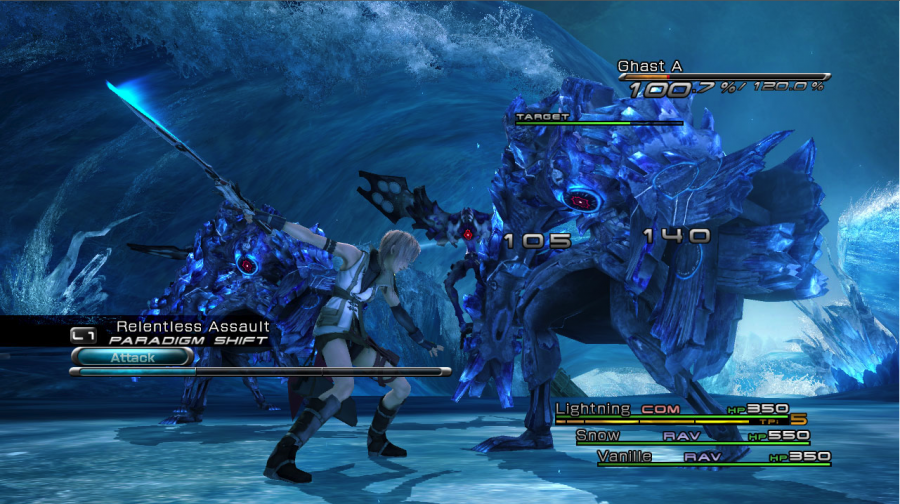By Stephen A. Swain
 After a five-year wait, Square Enix has released “Final Fantasy XIII” stateside.
After a five-year wait, Square Enix has released “Final Fantasy XIII” stateside.
Fans of the Final Fantasy series will find that Square Enix has made major overhauls to the Role-Playing Game (RPG) formula, while newcomers will find the new “Final Fantasy” easy to delve into. Final Fantasy takes most of the staples from RPGs and does away with them. Traditional towns and shops? Gone. Sprawling open environments and world maps? Dismissed.
Do not let these changes scare you. I am a “Final Fantasy” fan through and through, and when I heard of these changes, I was admittedly skeptical of FFXIII. Fortunately, Square Enix does a fantastic job of evolving the traditional RPG while keeping the staples of an interesting story, relatable characters, massive set pieces, and a fantastic battle system.
FFXIII takes place in the world of Pulse. The main protagonist is Lightning, an ex-soldier from the floating city of Cocoon. The citizens of Cocoon depend on magical beings who constructed Cocoon, the fal’Cie. There was a great war between Pulse and Cocoon that Cocoon won, but left the citizens of Cocoon in fear of another invasion from Pulse. Lightning and the other protagonists get caught up in the fear aimed at Pulse as a result of their own actions. However, each of their individual goals and motivations bring them together with a united purpose.
Upon loading FFXIII, the first thing you will notice is how gorgeous everything looks. The CGI scenes are amazing as everything is rendered in a hyper-realistic fashion. The Crystal Tools engine created specifically for FFXIII renders in game graphics beautifully, too.
The English voice acting is high quality and the lip-syncing is excellent. Even the menus for managing party members, equipment, and items are eye-candy. In short, Square delivers on the graphical side, as FFXIII is one of the best looking games so far this year.
Masashi Hamauzu has returned from his shared role in Final Fantasy X’s score to become lead composer for FFXIII, and he does an excellent job of using different styles of music to match the moods and some of the themes are more memorable than previous Final Fantasy music.
One of the main overhauls is the battle system. FFXIII does away with random battles with parties on one side and enemies on the other, for a more fluid experience. All enemies are visible on the map before encounters, so you can avoid battles instead of having them forced on you at random, unforeseeable intervals.
Once battle begins, there is a smooth transition between the map and the battlefield and your party’s Active Time Bar (ATB) begins filling. A player will only directly control the party’s leader in each battle, and there can be up to two other party members fighting alongside you.
Each action, whether it is an attack, magic, or skill, takes a certain amount of the ATB. More powerful techniques take up more sections of the ATB. The player can select “Auto-Battle” or queue up the actions themselves. A player can try to hack their way through with just the attack command, but the real fun begins when the player makes use of the Paradigm system.
Paradigms are six different classes that can be switched around during a battle. Each class performs a specific role in combat (ranging from Commando for physical attacks to Ravager for black magic attacks). The party obtains Crystal Points (CP) after every match, and character growth is controlled by the player spending CP on each class to earn skills or improve stats.
The player can switch between classes to gain access to different attacks as each situation dictates, with the main aim being to “Stagger” an opponent so that additional damage may be dealt. The player can choose what classes other party members take.
Upon losing, an option to “Retry” against that enemy appears. Upon winning, the party status is completely restored to normal and the party is graded on their performance.
Control over various game mechanics does not come early. For the first 5-6 hours of the game, FFXIII develops the characters and the world. With this comes an extremely linear first few hours, but the game opens up more options and bigger environments as the player advances. Fans of previous entries in the series may be put off by this approach, but FFXIII really focuses on telling a story.
FFXIII takes some bold steps. Not everyone will like these changes, but they are welcome changes in a genre that has become very redundant in its stories, characters, and game play mechanics. FFXIII is stepping out into some new territory, but it does so with confidence, creating a world with a cast of excellently developed characters, interesting lore, and plenty of flashy moments only a Final Fantasy game could deliver.
Bottom Line: Every change Square Enix has made to the Final Fantasy formula for FFXIII has been worthwhile, and the game still keeps the series’ trademark flash and storytelling intact. Fans of the series and newcomers alike should welcome this latest entry.
Score: 4/4









